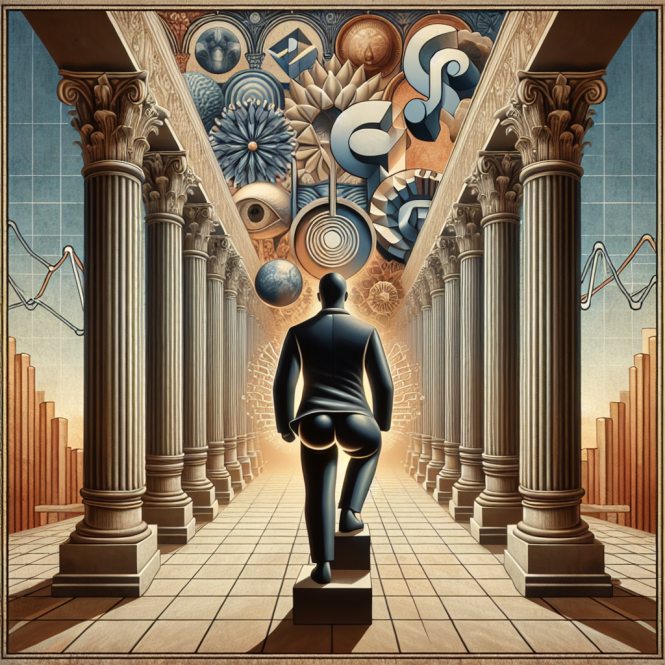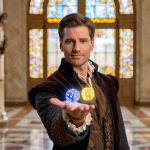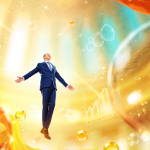Expertise Trap: Why Experts Fail Like Donkeys in Disguise
Oct 29, 2024
Introduction: When Knowledge Becomes Your Greatest Enemy
Picture this: A seasoned Wall Street veteran, surrounded by six monitors displaying real-time market data, sits paralyzed as millions evaporate from his portfolio. Meanwhile, a teenage crypto trader, armed with nothing but intuition and a smartphone, makes the trade of a lifetime. What separates these two? The very thing we’re taught to value most is expertise.
A peculiar phenomenon occurs in the labyrinthine world of financial markets: The more expertise one accumulates, the more susceptible one becomes to catastrophic failure. As a Dartmouth’s Tuck School of Business professor, Sydney Finkelstein notes, “Being the most knowledgeable and experienced person isn’t always a good thing.” This counterintuitive reality challenges everything we believe about success in the financial markets.
The Ancient Art of Knowing Nothing
Consider Socrates, who famously declared, “I know that I know nothing.” This philosophical stance, far from being mere humility, might be the most sophisticated investment strategy ever conceived. Imagine standing in the Agora of ancient Athens, where Socrates would challenge the most respected merchants and money-lenders of his time. These “experts” could recite every trade route, calculate profits in their sleep, and predict seasonal price fluctuations with remarkable accuracy. Yet, when markets shifted unexpectedly – when Persian wars disrupted trade or new silver mines flooded the monetary system – these experts often faced financial ruin.
The parallel to modern markets is striking. Today’s financial experts arm themselves with artificial intelligence, quantum computers, and complex derivatives yet still fall prey to the same cognitive traps that destroyed ancient merchants. Consider the hedge fund Long-Term Capital Management, staffed with Nobel laureates and brilliant mathematicians, which spectacularly imploded in 1998. Their profound knowledge of mathematical models became their Achilles’ heel, blinding them to simple market realities that any street vendor would have recognized.
This “curse of expertise” operates like a sophisticated form of mental quicksand – the harder you struggle to apply your knowledge, the deeper you sink. Take the case of a veteran trader who lost $100 million during the 2020 pandemic crash—his decades of experience told him that markets couldn’t possibly fall so far so fast, that his models couldn’t be wrong, that his expertise couldn’t fail him. Each layer of knowledge became another chain binding him to his losing position.
But here’s where it gets fascinating: Studies in neuroscience reveal that experts’ brains process information differently. When confronted with market data, their neural pathways automatically filter information through existing knowledge frameworks, often discarding crucial anomalies that don’t fit their established patterns. It’s as if their expertise creates a sophisticated form of blindness, where they can only see what they already know.
The solution isn’t to abandon knowledge but to achieve what Zen masters call a “beginner’s mind” – the ability to approach each moment fresh, unencumbered by the weight of past learning. This requires a peculiar mental aikido, using expertise without being trapped by it. Like a master martial artist who knows when to be soft despite their strength, the truly sophisticated investor knows when to embrace ignorance despite their knowledge.
Think of it this way: Every piece of market expertise is like a lens through which we view reality. The expert’s challenge is not collecting more lenses but knowing when to remove them all and see with the naked eye. This is why some of history’s most successful trades came from moments of radical simplicity – when investors stripped away their sophisticated analysis and acted on basic truths that even a child could understand.
The ancient art of knowing nothing isn’t about cultivating ignorance; it’s about maintaining the ability to see beyond your knowledge when markets demand it. It’s about recognizing that sometimes, the most sophisticated move is to set aside sophistication entirely. In today’s complex markets, this skill – the ability to selectively unknow – might be the most valuable expertise.
Dancing with Chaos: Lessons from History’s Greatest Traders
Marcus Licinius Crassus, ancient Rome’s wealthiest investor, built his fortune not through expertise but through exploiting uncertainty. During Rome’s frequent fires, he would purchase burning buildings at bargain prices, using his private fire brigade to extinguish the flames. This counterintuitive approach – embracing chaos rather than trying to master it – offers a striking lesson for modern investors.
Technical analysis, that beloved tool of market experts, often becomes a sophisticated form of self-deception. Paul Tudor Jones built his legendary status not on complex chart patterns but his ability to read market psychology. The charts were merely a window into mass behaviour, not a crystal ball of certainty.
Breaking Free: The Strategic Ignorance Revolution
Mark Twain once quipped, “It ain’t what you don’t know that gets you into trouble. It’s what you know for sure that just ain’t so.” This wisdom perfectly encapsulates the expertise trap in financial markets. The most dangerous assumptions are not the ones we question but the ones we consider too obvious to question.
Experts often suffer from what behavioural economists call “confirmation bias on steroids.” Their vast knowledge becomes a lens through which they filter information, rejecting anything that contradicts their existing beliefs. This creates a dangerous feedback loop in which expertise reinforces itself, becoming increasingly divorced from reality.
The Paradox of Unlearning: Your New Edge
Despite his immense knowledge, Stanley Druckenmiller maintained his edge by regularly “forgetting” what he knew. His ability to approach each market day with fresh eyes, unencumbered by the weight of expertise, allowed him to spot opportunities others missed.
Consider these practical strategies for escaping the trap:
1. The Beginner’s Mind Technique
– Start each trading day by questioning your most basic assumptions
– Deliberately seek perspectives that contradict your expertise
– Maintain a trading journal of “impossible” market scenarios
2. The Strategic Ignorance Protocol
– Regularly “forget” your technical analysis
– Trade small positions in unfamiliar markets
– Listen to market opinions from non-experts
Mastering the Art of Selective Foolishness
The most successful investors aren’t those who know the most but those who can most effectively unlearn when necessary. This requires a peculiar kind of courage – the courage to appear foolish, admit uncertainty, and abandon the expertise that brought success in the first place.
To escape the expertise trap, consider these counterintuitive principles:
1. Embrace uncertainty as a source of opportunity
2. Value questions more than answers
3. Treat expertise as a tool, not an identity
4. Cultivate strategic ignorance
5. Practice regular unlearning
The true master isn’t the one who knows everything but maintains the ability to know nothing when necessary. Like a skilled martial artist who learns to relax in combat, the successful investor must learn to loosen their grip on expertise precisely when it seems most needed.
Perhaps the greatest wisdom in market investing isn’t in knowing more but in knowing how to be selectively foolish. The expert who can occasionally wear the cap of the fool—questioning, wondering, and seeing with fresh eyes—ultimately prevails.
The next time you find yourself certain about a market move, remember: The most dangerous animal in the financial jungle isn’t the bear or the bull, but the donkey disguised as an expert, carrying the heavy bags of knowledge that blind it to reality. True market mastery might not lie in accumulating more expertise but knowing when to shed it.











